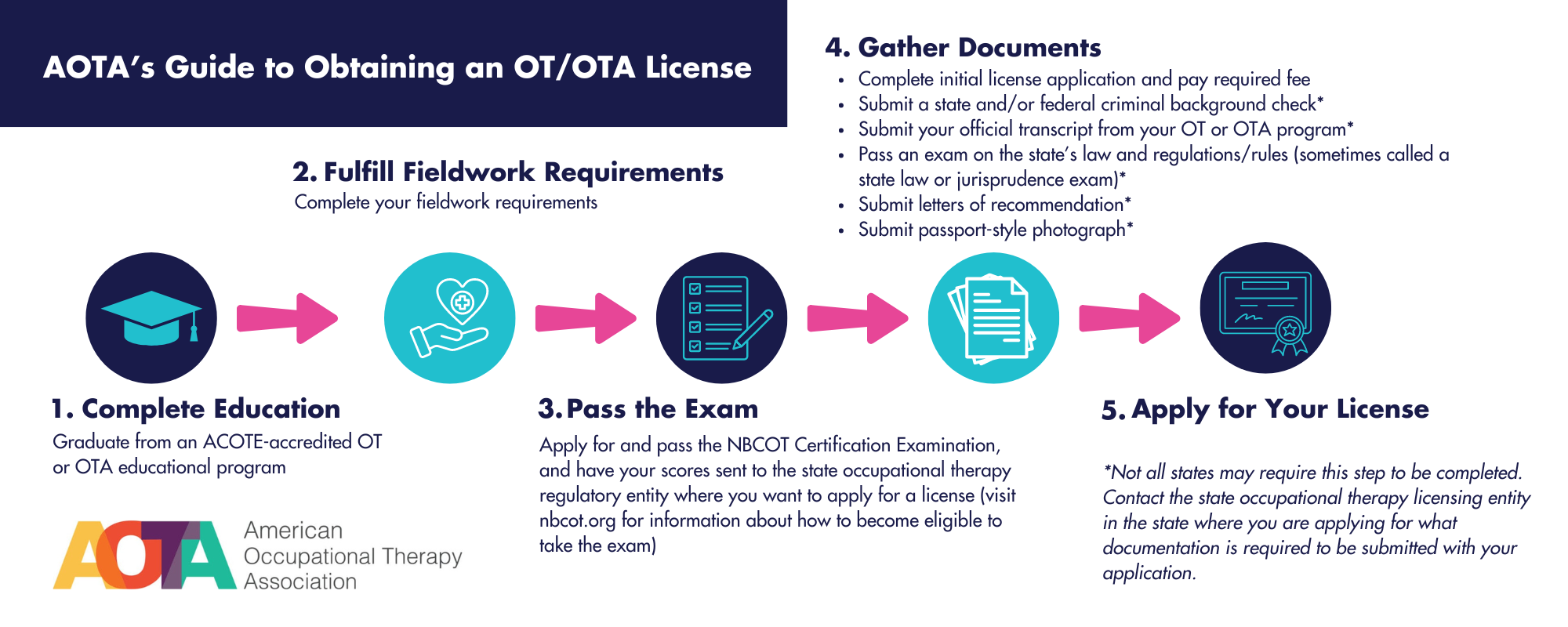OT LICENSURE
Occupational therapists and occupational therapy assistants must obtain a license to deliver occupational therapy services in all 50 states, including the District of Columbia, Puerto Rico, and Guam. This license bestows upon you the legal authority to practice occupational therapy within the specific state of licensure.
It’s important to distinguish between your occupational therapy license and the certification achieved through the National Board for Certification in Occupational Therapy (NBCOT) exam. The license is the legal permission to practice, while certification is earned through successfully passing the NBCOT examination.
OT Licensure by State

Core Licensing Requirements

Key Licensing Criteria
- Graduate from an ACOTE®-accredited OT or OTA educational program.
- Fulfill fieldwork requirements.
- Apply for and successfully pass the NBCOT® Certification Examination. Visit the NBCOT website for additional information on the examination process, including Score Transfers and Eligibility Confirmation Notices. You’ll need to create an account to access NBCOT services and resources.
- Submit an initial license application and pay the requisite fee for each state or jurisdiction where you plan to practice or hold a license.
- Completion of a state and/or federal criminal background check.
- Successful completion of an exam on the state’s laws and regulations (sometimes referred to as a state law or state jurisprudence exam).
- Submission of an official final transcript from your OT or OTA educational program.
Supervision Overview
Supervision Process
Variability in State Requirements

State License Renewal
- Complete and submit a license renewal application to your state licensing entity.
- Pay the prescribed renewal fee.
- Ensure compliance with mandatory continuing education or continuing competency hours, even though proof may not be immediately requested during renewal.
Continuing Education Requirements
It is your responsibility to stay informed about your state’s specific requirements. Our offerings provide numerous opportunities to stay abreast of the latest research, interventions, and trends in the OT profession, with some options available at no cost.
Significance of License Maintenance
Timely License Renewal
FAQ
If I have a certificate to practice occupational therapy, why do I need a license?
The National Board for Certification in Occupational Therapy (NBCOT) oversees the national certification examination for occupational therapists and occupational therapy assistants. Explore the certification criteria further by visiting the NBCOT website. State licensure regulations define the prerequisites for acquiring a license and engaging in occupational therapy practice. Obtaining initial certification through NBCOT stands as a fundamental component of licensure requirements within the occupational therapy field. Stay informed and prepared for your occupational therapy journey by understanding and meeting these crucial standards.
Can you apply for multiple OT state licenses at one time?
Applying for a license has no state limit, providing flexibility in your choices. While the foundational licensure criteria are consistent, additional requirements may differ. Conduct thorough research on the unique requirements in each state before applying, and create a well-organized document checklist, including the application, transcript, letters of recommendation, and a criminal background check. This ensures a smooth application process tailored to each state's specific needs.
Can I apply for a license at any time?
In most cases, yes you can apply for an OT license at any time. However, you must meet all requirements established in law or regulation by the state or jurisdiction in which you are applying in order to receive the license. States may have specific requirements for individuals who, despite completing their education and passing the exam, choose not to pursue licensure.
Do I need to renew my OT licenses?
Yes, you will need to renew your OT licenses and the time frame and requirements can vary from state to state. Most will require renewal every two years. Failure to renew your license results in the inability to practice as an occupational therapy practitioner. Continuing to work without a valid license can lead to significant legal consequences.
How do I renew my OT license?
Renewal prerequisites differ among states. Typically, the process involves submitting a renewal application, paying a fee, and fulfilling specific continuing education or continuing competency obligations.
How much does an OT license cost?
Each state determines the cost therefore the costs vary.
Is continuing education or continuing competency required?
Continuing education or continuing competency encompasses a series of tasks essential for license renewal. The purpose of these activities is to stay abreast of developments in the occupational therapy field, elevate your professional practice, and showcase your clinical expertise and proficiency. Examples of such activities may involve volunteering for occupational therapy services, engaging in research, mentoring fellow practitioners, supervising fieldwork or doctoral students, or contributing to occupational therapy journal articles. Each state maintains its own catalog of approved continuing education or continuing competency activities.

